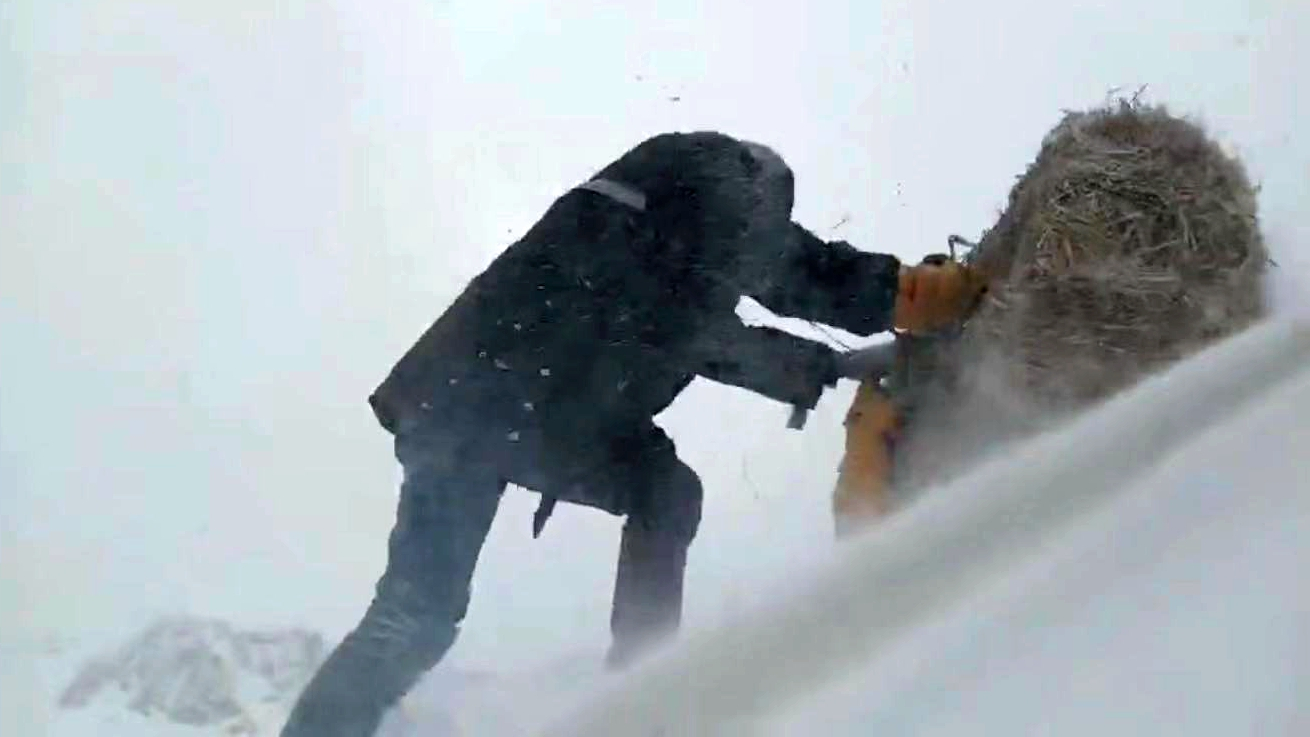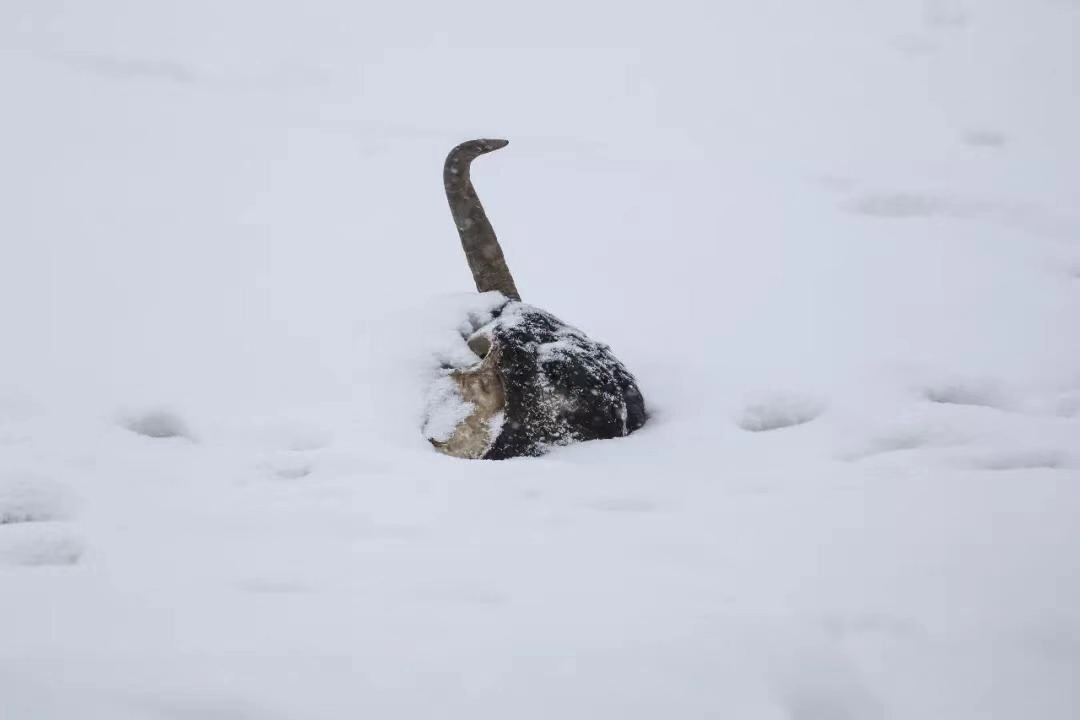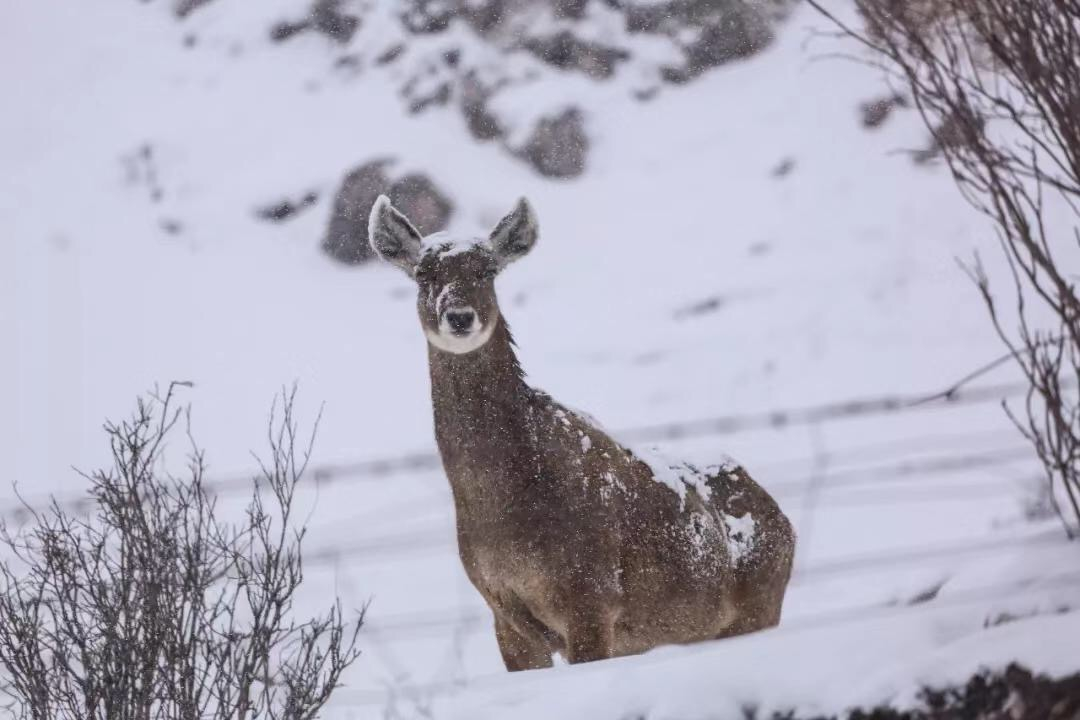
Animal
13:16, 23-Feb-2019
People risk their lives to save wild animals in snowstorm
By Xing Fangyu
01:12

Carrying a bundle of straw on his back and walking, Pema's step has never been stopped by the snowstorm. He and other local environmentalists were sending fodder to the starving herbivores. And now, they encountered a river.
The river ran cold over their feet. Due to the uninterrupted snow happening in Yushu Tibetan Autonomous Prefecture in northwest China's Qinghai Province, the wild animals' live in Sanjiangyuan area are threatened. There's no other way around and no time left as well. The rescue team had to walk into the icy river and deliver the fodder to the starving animals.
Pema is one of the 75 village environmental protection leaders named by the Snowland Great Rivers Environmental Protection Association (SGR), the first environmental NGO in Qinghai Province.
He has put his own life and cattle behind when facing this disaster. He believes the cattle have people to take care of, but the wildlife has no one to rely on. If his cattle die, he can buy a new one, but if the wild animals die, there's no way to bring them back.

The snowstorm has caused severe damage to the animals. /Photo via the Snowland Great Rivers Environmental Protection Association (SGR)
The snowstorm has caused severe damage to the animals. /Photo via the Snowland Great Rivers Environmental Protection Association (SGR)
Dhontrup Chompel, head of the SGR, barely slept during the first week. With other volunteers, he has to provide fodder to local herdsmen for their livestock meanwhile checking up on wildlife.
In one of the worst-hit areas, Hashul village, Dhontrup saw many broken vehicles due to the weather and topography. The rescuers put their own lives in danger in order to save the animals. Eventually, they managed to cross the Hashul Mountain Pass where at 4,815 above sea level and reached the village.
On the Tibetan Plateau, herdsmen are tightened with cattle, and cattle depend on the grassland. The continuous snow has covered the whole plateau, and all the grass-fed animals are suffering from cold and starving.
The local herdsmen received supplies from government and NGOs, but they also share the fodder to the wild animals. Wildlife is mostly unreachable by vehicle. People need to cross mountain and river in the blizzard by foot. When approaching danger, "we just go through it without a second thought," said Dhontrup.

Herbivores such as Himalayan blue sheep, Thorold's deer and goa find it excessively hard to graze. /Photo via the Snowland Great Rivers Environmental Protection Association (SGR)
Herbivores such as Himalayan blue sheep, Thorold's deer and goa find it excessively hard to graze. /Photo via the Snowland Great Rivers Environmental Protection Association (SGR)
"Once we have 50 people, and one of them is a young lady who is just around 20," described by Dhontrup, "I felt sorry for our people by looking at them wearing cloth shoes. They used strings to tighten (the trousers) to prevent the snow."
Fortunately, the SEE Conservation has also provided some materials such as snow mirror, gloves and some other waterproofing outdoor equipment for the first line volunteers. Jiu Xie, the director of Ecological Protection department of the Three-River-Resources National Park; and Lu Zhi, the Chinese conservation from Peking University also provide support to the rescue team.
The local government, NGOs and individuals, have worked together to protect herdsmen and animals. The number of dead animals is unclear, but according to Xinhua, the Department of Emergency Management of Qinghai Province's report said until February 19. Over twenty thousand cattle died, and 688,000 cattle found it hard to graze in Yushu.
"I asked our environmentalists do they feel the work is too tough to do, but they told me they don't take the difficulties as obstructions," Dhontrup told CGTN, "they believe all of our efforts is a kind of respect for another life; in turn, it's a way we respect our own life."
(Video contributed by the SGR)

SITEMAP
Copyright © 2018 CGTN. Beijing ICP prepared NO.16065310-3
Copyright © 2018 CGTN. Beijing ICP prepared NO.16065310-3